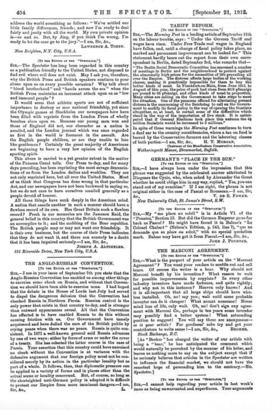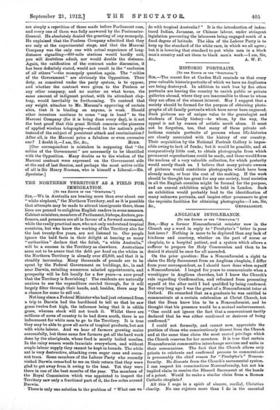[To THE EDITOB Or MI u8ractscon-n SIR,--I cannot help regarding
your article in last week's issue as being unwarranted and superfluous. Your arguments
are simply a repetition of those made before Parliament rose, and every one of them was fully answered by the Postmaster. General. He absolutely denied the granting of any monopoly. He explained that the Poulsen Company admitted that they are only at the experimental stage, and that the Marconi Company was the only one with actual experience of long- distance signalling-600-mile stations would hardly suit, you will doubtless admit, nor would double the distance. Again, the ratification of the contract under discussion, it has been definitely stated, would not result in the " exclusion of all others "—the monopoly question again. The " critics of the Government" are obviously the Opposition. Their duty, as conceived under the party system, is to oppose, and whether the contract were given to the Poulsen or any other company, and no matter on what terms, the same amount of indignant protest, with its attendant clap- trap, would inevitably be forthcoming. To contend that any weight attaches to Mr. Marconi's approving of certain sites, that it is binding on anyone, is weak. Should other inventors continue to come " cap in hand " to the Marconi Company (for it is being done every day), is it not the best proof that this great British concern—the pioneers of applied wireless telegraphy—should be the nation's pride instead of the subject of persistent attack and recrimination ? After all, is the Marconi price a fabulous or even excessive one? I doubt it.—I am, Sir, &c., Tams.
[Our correspondent is mistaken in supposing that "the critics of the Government " are necessarily to be identified with the Opposition. Many doubts as to the wisdom of the Marconi contract were expressed on the Government side at the end of last Session, and perhaps the most active critic of all is Sir Henry Norman, who is himself a Liberal.—En. Spectator.]











































 Previous page
Previous page